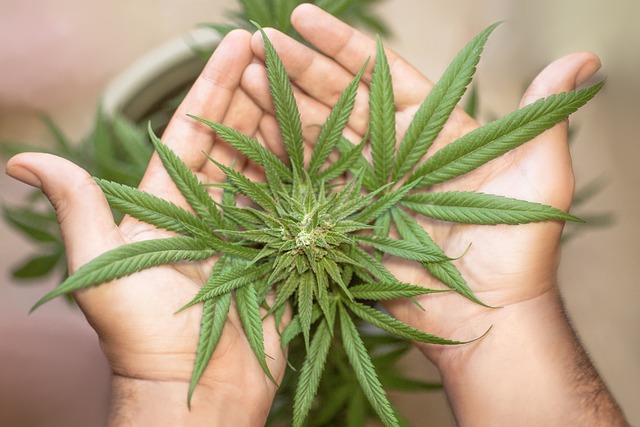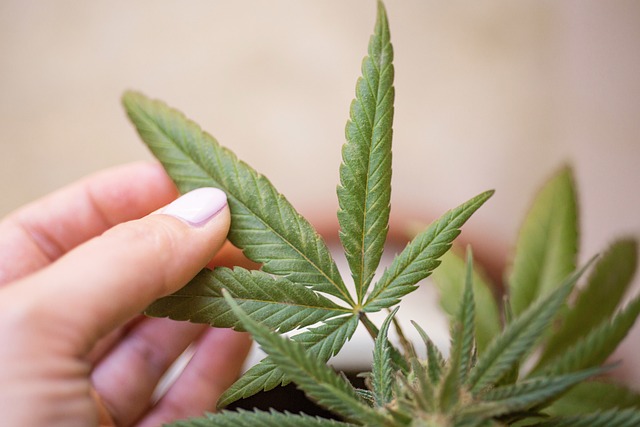The THCA flower, a non-psychoactive component of cannabis, has been found to possess strong anti-inflammatory properties. Studies indicate that THCA interacts with the endocannabinoid system by binding to CB1 and CB2 receptors, which helps regulate immune responses and inflammation. This interaction can reduce cytokine production and provide antioxidant protection against oxidative stress, common in chronic inflammation. The THCA flower's anti-inflammatory benefits are further enhanced by its unique terpene profile, which contributes to a broader range of therapeutic effects within the body. Ongoing research supports the use of THCA flower as a natural option for those seeking relief from inflammatory conditions, with potential applications in treating arthritis and other inflammatory disorders without the psychoactive side effects of THC. The anti-inflammatory efficacy of THCA flower is a subject of growing scientific interest, highlighting its promise as a therapeutic agent for inflammation-related diseases.
Discover the transformative power of THCA flower, a natural compound with potent anti-inflammatory effects. This article delves into the myriad benefits of THCA flower, exploring its role in alleviating inflammation and providing holistic pain relief. From understanding the endocannabinoid system to comparing it with traditional anti-inflammatory methods, learn how THCA flower can be integrated into a wellness routine for optimal health. We’ll navigate through its therapeutic potential beyond inflammation, ensure safe usage, and offer guidance on selecting and storing this botanical wonder. Join us as we unlock the secrets of THCA flower and its anti-inflammatory effects for a healthier you.
- Unlocking THCA Flower's Anti-Inflammatory Potential
- The Science Behind THCA's Anti-Inflammatory Effects
- THCA Flower as a Natural Remedy for Inflammation
Unlocking THCA Flower's Anti-Inflammatory Potential

The THCA flower, which is the raw form of cannabis before heating it into THC, possesses a remarkable profile of anti-inflammatory effects. Tetrahydrocannabinolic acid A (THCA), the primary non-psychoactive compound in raw cannabis, has been studied for its potential to alleviate inflammation. Research indicates that THCA interacts with the body’s endocannabinoid system through its affinity for both CB1 and CB2 receptors, which play pivotal roles in regulating immune responses and managing inflammatory conditions. This interaction can lead to a modulation of cytokine production, a key factor in the inflammatory response, offering a natural approach to managing inflammation-related disorders.
Furthermore, the anti-inflammatory potential of THCA flower extends beyond its direct interaction with cannabinoid receptors. It also exhibits antioxidant properties that can protect cells from oxidative stress and damage, a common contributor to chronic inflammation. Additionally, the terpene profile of the THCA flower contributes to its therapeutic effects by enhancing the anti-inflammatory response and providing additional mechanisms for targeting inflammation at various levels within the body. As such, the THCA flower holds promise for those seeking natural alternatives to manage inflammatory conditions, with ongoing research continuing to unveil its full potential.
The Science Behind THCA's Anti-Inflammatory Effects

The therapeutic potential of THCA, or tetrahydrocannabinolic acid, a non-psychoactive compound found in the cannabis plant, has garnered significant attention due to its promising anti-inflammatory effects. Scientific studies have revealed that THCA interacts with the body’s endocannabinoid system through its engagement with both CB1 and CB2 receptors. This interaction is pivotal in modulating inflammation, a response crucial to immune system function but often implicated in various pathologies when dysregulated. THCA’s anti-inflammatory properties are believed to stem from its ability to inhibit certain pro-inflammatory cytokines and enzymes like COX-2, which play a role in pain and inflammation. Preclinical research has demonstrated that THCA can reduce inflammatory responses associated with conditions such as arthritis and colitis, offering a natural alternative for managing inflammatory symptoms without the psychoactive effects of its isomer THC. The anti-inflammatory effects of THCA are underpinned by a complex interplay between cannabinoid receptors, cell signaling pathways, and the body’s immune response, highlighting its potential as a therapeutic agent in managing various inflammation-related disorders.
THCA Flower as a Natural Remedy for Inflammation

Research into the therapeutic properties of THCA, or tetrahydrocannabinolic acid, the raw cannabinoid found in hemp and marijuana plants, suggests that the THCA flower may hold significant anti-inflammatory effects. Unlike its psychoactive counterpart THC, THCA is non-psychoactive, allowing for health benefits to be harnessed without the mind-altering side effects. Studies have indicated that THCA can inhibit certain enzymes and molecules known to play a role in inflammation, potentially offering relief for those suffering from conditions like arthritis or experiencing acute inflammation due to injury. The anti-inflammatory effects of THCA flower are believed to be due to its ability to interact with the body’s endocannabinoid system, a complex cell-signaling system responsible for regulating a range of physiological processes, including pain, immune response, and inflammation. Users interested in exploring these benefits can consume THCA flowers through various methods, including smoking or vaporizing, or by incorporating them into edibles after decarboxylating to convert THCA into THC. As research continues to evolve, the potential of THCA flower as a natural remedy for inflammation becomes increasingly promising.
THCA flower, with its potent anti-inflammatory properties, stands as a promising natural alternative for those seeking relief from inflammation. The scientific community has shed light on the mechanisms behind its effects, revealing how it could play a significant role in health and wellness. As research continues to unfold, the potential applications of THCA flower may expand beyond current understanding, offering hope for natural treatment options without compromising efficacy. Its benefits are not just theoretical; they are grounded in scientific evidence, making it an intriguing subject for future study and a valuable addition to the health and wellness landscape.
